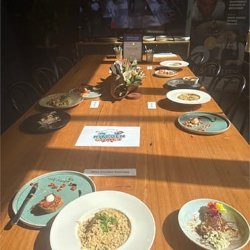Another shocking thing I found out about the use of water is that when people wash the dishes, they put hot water in the sink, add some dishwashing detergent, put the dishes in the sudsy water, then wash them with a sponge, which is fine up to there, but then they take the dishes out and wipe them up as is, without first rinsing them in cold or hot water. I thought, “But that means the detergent is still on the dishes.” Yet, that seems to be normal here. After seeing that, I began worrying that using a lot of water to rinse dishes might be bad, that wasting water might be bad manners, and now, in public places like campgrounds, I wash up as quickly as possible, trying to use only a little water.
There are four levels of water-saving restrictions implemented because of the drought and big wildfires, from level one to four. Four is the highest and it requires water savings of 30%. Notices have been sent out to residents in areas where level two water restrictions have come into force and they include the following bans and limits.
Banned
• Watering the lawn
• Using outdoor showers (There are numerous places in Australia where showers are installed outdoors, such as beaches and public restrooms.)
• Using toys that use water, such as water guns
• Using sprinklers
Limited Use
• Up to 10 minutes for a boat and trailer
• House cleaning (trying as much as possible not to use water)
• Topping up fish tanks with only enough water to keep the fish alive (Completely changing the water not OK)
• Topping up swimming pools only with a hand-held hose (Completely changing the water not OK)
• Time limits apply when laying a new lawn.
Allowed
• Watering the garden up to 30 minutes using a hand-held hose with a flow control function
• Garden microspray or drip watering up to 15 minutes
• Car washing using a bucket or hand-held hose with a flow control function up to 10 minutes
• Using buckets of water to wash pets, water the garden, or wash the car is OK anytime.
And on the back of the notice, there are some tips on how to save 50 liters of water a day.
• Wash your clothes all together.
• Stop pre-rinsing dishes (save 45 liters/5 minutes).
• Don’t flush the toilet when it’s a “pee” and use the button for pee to flush a “poo” (save 10 liters of water per day).
• Reduce shower time by 2 minutes (save 18 liters of water).
• When washing your face or hands, or brushing your teeth, don’t let it run the whole time (save 2 liters of water).
Seems to me the toilet would get smelly if you don’t flush the pee, but here is some in-depth advice.
There are many things that, growing up in Japan, I thought were common knowledge but are not common knowledge in other countries. The problems of plastic waste and global warming are problems that can be changed for the better by each person gradually improving their awareness. Water is the same. I think we can preserve water by each person doing their bit, and by saving water, we will come to a deeper understanding of the importance of water.
The actual notification leaflet about water restrictions that was sent out





















































